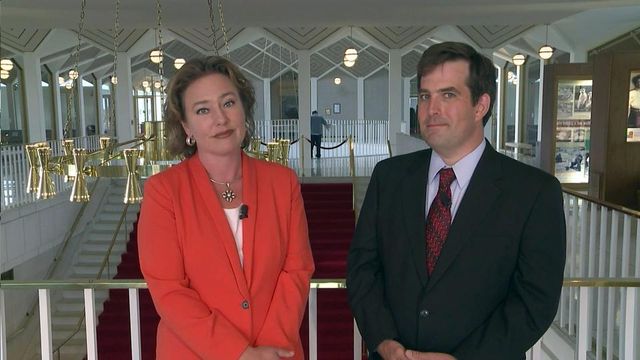RALEIGH, N.C. — Good morning and welcome to Today @NCCapitol for Thursday, May 29. Here's what's going on at the General Assembly and elsewhere in state government:
BUDGET: Members of the state Senate will spend the day reviewing their
$21 billion state budget plan, details of which were posted online late Wednesday night:
The Senate budget gives the governor the power to appoint the head of the State Bureau of Investigation, currently the prerogative of the independently elected Attorney General. It also moves the State Crime Lab to the Department of Public Safety, an agency overseen by Gov. Pat McCrory, a Republican, rather than Attorney General Roy Cooper, a Democrat.
This move drew immediate criticism from Cooper.
"For 75 years, an independent SBI has without bias rooted out corruption in the executive and legislative branches. With this move, the legislature protects itself and the governor at the expense of government integrity and ignores North Carolina law enforcement's opposition," he said in an email late Wednesday.
SENATE SCHEDULE: The Senate is scheduled to come into session at 8 a.m. to begin moving the budget from one committee to another. Senators won't meet for their floor session, during which they are expected to sign off on a tax and regulatory reform bill, until later in the day. No firm time was announced for that session. We do know:
- The Senate Appropriations Committee is scheduled to review the budget bill starting at 8:30 a.m.
- The Senate Finance Committee is scheduled to review the budget at 1 p.m.
- The Senate Pensions and Retirement Committee will review the budget after the close of the Finance Committee.
This schedule would allow the Senate to complete work on the budget and send it to the state House this week.
TAX and DEREGULATE: When the Senate does meet in floor session – stay tuned to the @NCCapitol Twitter feed for updates – they are set to sign off on a
package of changes to last year's sweeping tax reform measure. The most controversial of the changes involves paring back this year how cities may impose business privilege license taxes and then allowing the privilege license to expire on July 1, 2015.
Top House and Senate budget writers have worked closely on the bill, with Rep. Julia Howard, R-Davie, and Rep. David Lewis, R-Harnett, attending the Senate Finance Committee that vetted the bill. House tax writers say they are happy enough with the Senate's work on the bill that they will vote to send it to the governor as is.
"We will vote to concur," Howard said Wednesday. That vote could come as soon as Thursday afternoon, she said.
The state Senate is also expected to approve a sweeping regulatory reform measure. It has already given the plan a tentative nod, but disagreement among Republicans sparked a 90-minute closed door meeting Wednesday. However, Senate Rules Chairman Tom Apodaca, R-Henderson, said he hoped the chamber would vote to send the measure to the House Thursday afternoon.
THE HOUSE: The state House is scheduled to meet at 1 p.m. The most pressing item on its schedule, other than a possible tax vote, is finishing work on a bill that critics say would
put North Carolina on the fast track to allowing drilling for natural gas. In particular, the measure would clear the way for companies to apply for drilling permits in 2015 and provides a mechanism to lift a moratorium on the hydraulic fracturing process, or "fracking," before the state's Mining and Energy Commission has fully adopted rules governing the process.
The measure passed through committee and onto the floor in the state House Wednesday will little public notice. But House Speaker Thom Tillis said the issue has been debated for a long time.
WRAL.com plans to carry the House Session live. Check the Video Central box on the homepage.
House Environment (10 a.m. | LOB 544): The committee is scheduled to take up a measure that environmental advocates say would severely curb wetland protections. A similar measure
stalled at the end of the 2013 session.
UPDATE: A committee notice issued at about 9:30 a.m. removed this wetlands bill from the calendar.
The Governor (10 a.m.): McCrory is expect to attend the Governor's Statewide Impaired Driving Task Force Meeting at the Department of Transportation at 10 a.m.
House Homeland and Veterans Affairs (Noon | 421 LB): The committee is scheduled to take up a bill adjusting the qualifications for the top leader of the North Carolina National Guard.
CLOSED DOORS: Among public bodies in the state, the North Carolina General Assembly is unique. Members of the Republican and Democratic caucuses are allowed, by law, to gather behind closed doors to discuss matters of policy and work out how the group will approach floor debate on a bill. For every other public body in the state – from town councils to boards of county commissioners and gubernatorially appointed panels – any gathering of more than half its members to discuss policy and information must be open to the public.
Legislators, by contrast, can gather enough of their members to decide the outcome of legislation away from the press and the public.
READING: Senate leaders are backing a bill that will allow schools more flexibility in implementing the Read to Achieve law. The 2012 law requires 36 tests to assess whether third-graders are up to grade level in reading comprehension. Those who are not, according to the law, must either attend a six-week reading camp over the summer or repeat the third grade.
U.S. SENATE: U.S. Sen. Kay Hagan spent much of the primary season on the defensive, as both Republican candidates and outside groups attacked her for her support of the Affordable Care Act. That changed Tuesday night, when Hagan teed off on her November challenger during a stop in Raleigh.






